Something Old, Something New, Something Borrowed, Something Blue

Something/Someone Old

The first black-and-white ball happened on Nov 28, 1966, and was invented (and hosted) by Truman Capote:
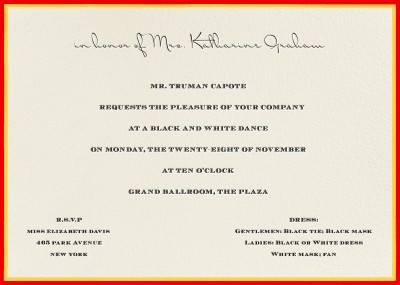
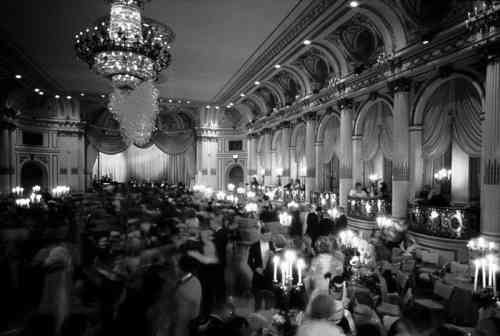
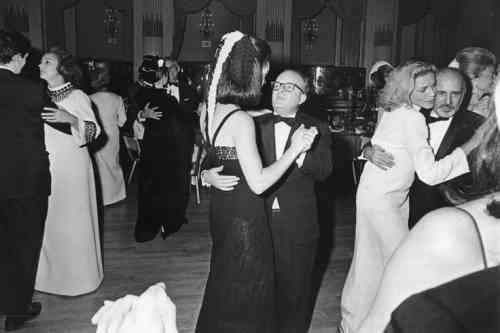
Capote was enjoying an apex of fame and social success after the January release of In Cold Blood, his true crime story of two drifters who killed a Kansas family. (Although I admire the diligent research and undeniable skill of the author, it's still beyond me why In Cold Blood made such an enormous splash. Perhaps no-one had written a true crime book before?)
On the social scene, Capote’s temperature, already sizzling past the boiling point, now blazed with the white heat of a supernova. New York’s literary-minded hostesses, thrilled that their saucy pet (a lapdog nicknamed, alternately, Tru Heart and Tru Love) had pulled off not just the greatest critical success in recent memory but also a major commercial coup, vied more strenuously than ever for his presence at their tables.
You see what I mean? It's a little amazing to imagine high-society New York hostesses clamoring to have the author of a novel about a mass murder at their social events. But so it was. Even more incongruous to me is the fact that the Kansas police detective who cracked the In Cold Blood case was similarly sought after!
As much of a draw as Capote at the book-launch celebrations was Alvin Dewey, of the Kansas Bureau of Investigation—the local detective who had been instrumental in cracking the Clutter case—in town to help the best-selling author savor his triumph. Dewey made an appearance at the home of Elsie Woodward, the formidable society matron on whom Dominick Dunne modeled his senior Mrs. Grenville.
At what other time would a Kansas police detective named Alvin Dewey be invited to the revels of the Manhattan elite?
With remarkable social acuity (he said himself he was a better publicist than an author), Capote, understanding that such a rise was usually paired with a subsequent decline, came up with an idea to keep his social capital high: throwing a very special party.
In June he evolved a plan guaranteed to refuel the In Cold Blood engine. He was in no shape to start another major book—his nearly six years working on the story had, he said, “scraped me right down to the marrow of my bones.” Instead he decided to give a party...Sitting poolside in Bridgehampton, at the house of his mother’s friend Eleanor Friede, Capote worked—with a concentration usually reserved for writing—entering (like one of God’s angels) the names of the chosen into a 10-cent black-and-white composition book. When he had filled its ruled right-hand pages, he turned it upside down and continued the roster on the opposite sides. Periodically, he would review the list, deleting names as he inserted new ones into the ledger. “The party,” Gerald Clarke notes, “was the product of a literary mind”—in this case, a manipulative instrument whose considerable might was applied to assembling a cast of characters and moving them about like so many chess pieces.
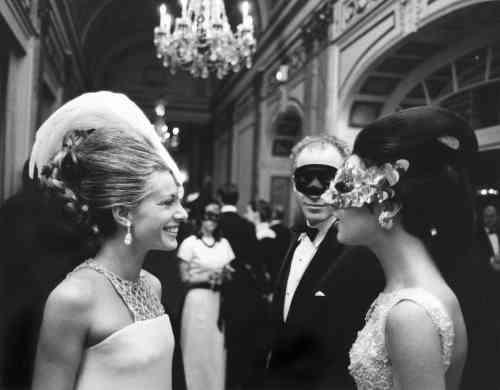
Of course, he let everyone know well ahead of time that he was giving a magnificent party, and was incredibly cagey about who was invited and who was not.
If Capote had yelled Fire! on opening night at the opera, the pandemonium among the Beautiful People that autumn could not have been more frenzied. Precipitating all the hysteria, says Peter Duchin, whose orchestra Capote hired for the party, was the simple truth that “if you weren’t invited, you’d think you were nowhere.”
People even made up lies about having to be out of the country on the day in question!
I believe it was the uncertainty over whether one was in or out, as much as Capote's fame, that created the incredible social importance of the party. Others think it was the exclusion of many of the rich, beautiful and desirable people that added to the attraction of the party:
“There was a slight note of insanity about the party,” Katharine Graham concedes. “There is just no rational reason why the whole situation escalated.” No rational reason, perhaps, but certainly some irrational ones. Former Condé Nast editorial director Alexander Liberman suggests, “When you think of all the people in New York, there were a tremendous number of exclusions. It titillated a lot of people.” As the aristocratic Parisian host Étienne de Beaumont purportedly remarked, “A party is never given for someone. It is given against someone.”
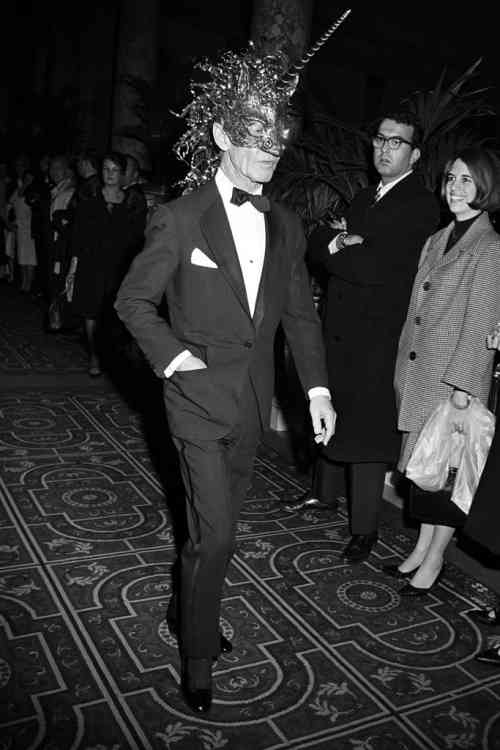
However, this event was not merely a triumph of self-promotion--though of course it was primarily that. Capote made two innovations--one aesthetic and one social. The aesthetic innovation was requiring his guests to wear only black and white:
Inspired by My Fair Lady’s breathtaking Ascot scene, costumed by Cecil Beaton entirely in black and white, [Capote restricted] his guests’ attire to this most severe of palettes. This decision, he felt, would bring at least visual unity to a convocation of people as different, says former Harper’s Bazaar fashion editor D. D. Ryan, “as chalk and cheese.” Capote explained, “I want the party to be united the way you make a painting.” Furthermore, all guests would be required to wear masks, and the ladies to carry fans. (Capote allowed only this last rule to be bent.) “I haven’t been to a masked ball since I was a child,” he said. “That’s why I wanted to give one.” The masks, according to his scenario, would free guests to dance and mingle as they pleased. At midnight the disguises would be removed.
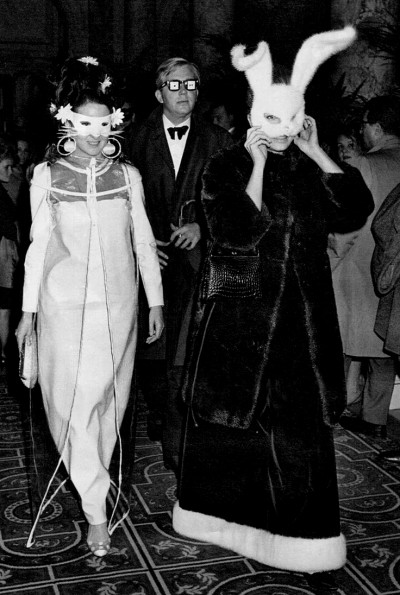
The social innovation was that this was the first notable occasion on which several social worlds were deliberately set to collide. Capote combined at his party the elites of several different worlds:
What gave the Black and White brew its intoxicating piquancy was the fact that he had flung together, in a gilt-edged melting pot, the most alluring power brokers in the worlds of high society, politics, the arts, and Hollywood—disconnected universes that collided, if not for the first time that evening, then at least with unprecedented force. “I have always observed,” Capote told Esquire, “in almost every situation, and I have been in almost every situation, that people tend to cling to their own types. The very rich people, for instance, tend to like the company of very rich people. The international social set likes international socialites. Writers writers, artists artists. I have thought for years that it would be interesting to bring these disparate people together and see what happens.”
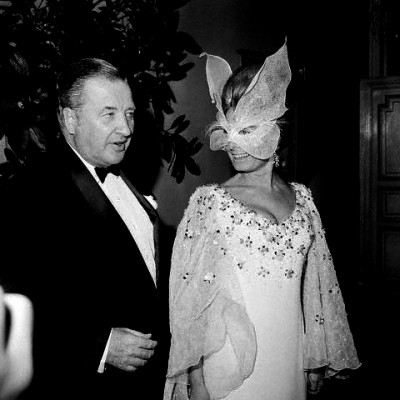
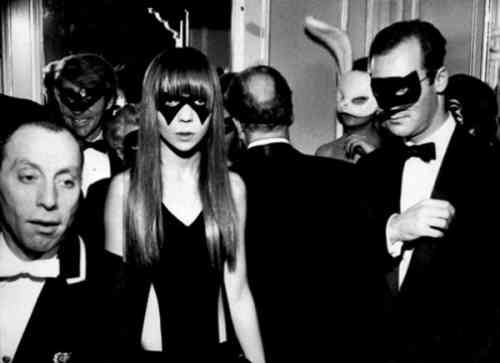
Capote not only excluded many people who would ordinarily attend such galas; he also included people who almost never would:
But by no means did Capote forget about the more obscure company he kept. Eleven of the gentry of Garden City, Kansas—a country doctor, a banker, a broadcaster, as well as the Deweys, Judge Tate’s widow, and a farmer named Odd Williams—strengthened the texture of the bouillabaisse. He also welcomed Katharine Graham’s secretary Elizabeth Hylton; family members of his lover of 18 years, writer and ex-dancer Jack Dunphy; one of his former schoolteachers; and a doorman from the U.N. Plaza. Says photographer Gordon Parks—who claims he was, along with Ralph and Fanny Ellison, “the Black of the Black and White Ball”—Truman was “very democratic. He used to say everybody goes to the bathroom for the same thing.”
While I'm not a big fan of high society or Truman Capote, I'm intrigued by artists working in unusual mediums, and creating a social event as art strikes me as noteworthy. So does the mixing of worlds, though I think Capote could have been far more radical in that regard. Still, I suppose he did have to stick with those he knew.
Something New


Someone is making a biopic about Ursula LeGuin. To say LeGuin is one of my favorite authors is a wrung-out-teabag-in-lukewarm-water phrase that does not convey her impact on my life. Like many of the best artists whose work we embrace, her voice has become a part of my internal landscape, and some of her best quotes operate as guideposts to my vagrant mind.
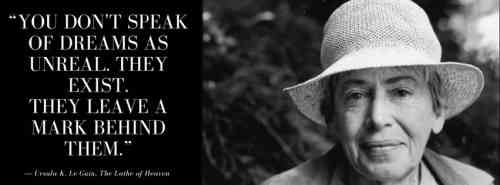
Because she is so important to me, it's perhaps understandable that my first reaction to the news of this biopic was mild dread. I truly hope these people do not fuck it up.
At least the director, Arwen Curry, seems to have taken her topic seriously; apparently she became a journalism student purely for the opportunity to interview LeGuin so she could make a movie about her life!
the desire to create a film about Le Guin’s life prompted [Curry] to get a degree in journalism to enter the field, and spent years interviewing the late author to examine her life and career.
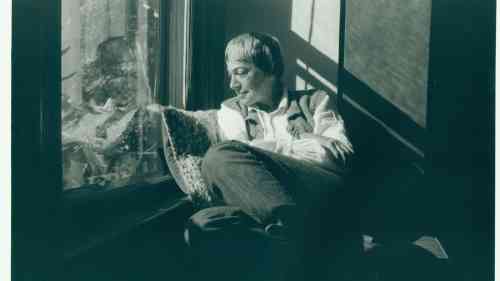
Curry kickstarted the film, Worlds of Ursula LeGuin, in 2016.
Here's the trailer, which replaces my mild dread with mild hope:
I am struck by the fact that one of the speakers in this trailer used almost my exact words about LeGuin: it is amazing to find a writer who can give you something at ten years old and then, when you're forty-five, still gives you something new, and sticks with you all the years in between.
Most of us will not see this movie until 2019, when it will be on PBS. Those of you who can and do go to film festivals might see it sooner.
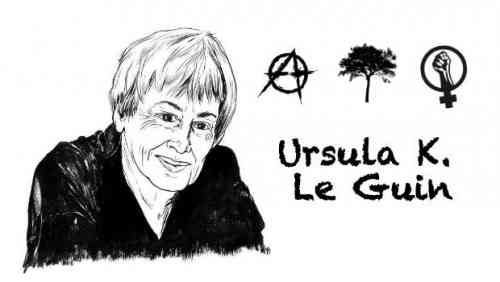
Something Borrowed
Apparently Assyrian and Sumerian merchants invented the practice of making loans.

They made loans of grain to farmers and traders who transported goods between cities:
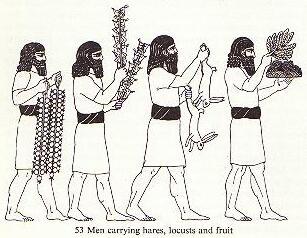
Oh, how I wish I could go back in time and tell them not to.
But probably the Medicis would have invented banking later, anyway:

Actually, they weren't alone, or even first among Italian noble families to get into finance: the Bardis and Peruzzis were in banking first.
Something Blue
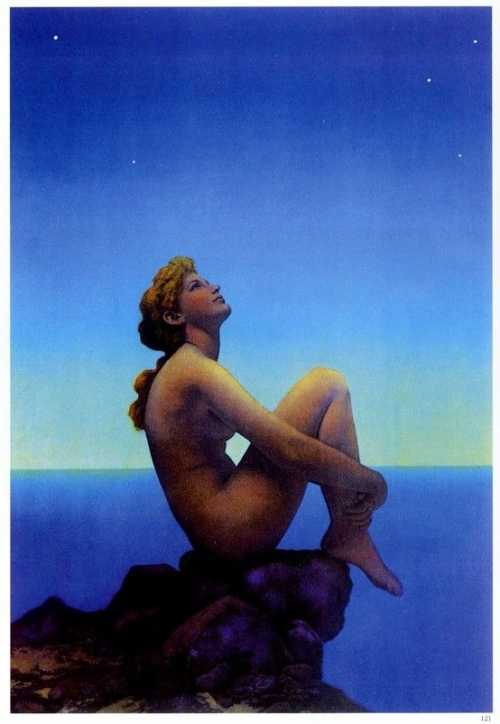
My Something Blue today is the Blue Ridge Parkway, which travels through mountains very dear to my heart. In this case age and beauty go hand in hand, as our eastern mountain chain is among the oldest in the world, and is certainly one of the most beautiful:



For obvious reasons, people seem to like the parkway best in the fall, but I love it in summer too:





Comments
Ursula K. LeGuin.....
I read The Left Hand Of Darkness 40-plus years ago when I was working on a BA in Classical English. It made an impression on me that still reverberates all these years later. What a mind. What a futuristic visionary she was. I look forward to the biopic. Like yourself, I hope it does justice to a great American writer. Rec'd, CStMS! Hope this finds you well and staying dry.
Inner and Outer Space: the Final Frontiers.
Wish I had time to read books
I used to read all the time and Ursula LeGuin was one of my favorites. Alas, the job I am in now requires so much reading that I am too tired to read books for pleasure.
Yaldabaoth, Saklas I'm calling you. Samael. You're not alone. I said, you're not alone, in your darkness. You're not alone, baby. You're not alone. "Original Sinsuality" Tori Amos
Harper, Truman, and the Blue Ridge Parkway
Good morning CStMS and 99ers.
Lee and Capote were next-door neighbors in Monroeville, Alabama. They met when they were five years old. Truman was Dill in Mockingbird. What opposites they were...recluse vs social butterfly. https://www.barnesandnoble.com/blog/14-things-you-didnt-know-about-harpe...
Social Security would not have passed Congress unless the Blue Ridge Parkway was built to connect the North Carolina Great Smoky Mountain National Park with the Shenandoah National Park. http://www.telemachusleaps.com/2011/03/blue-ridge-parkway-north-carolina...
Here's some advice about touring the parkway
http://www.campingroadtrip.com/outdoor-living-newsletter-september-2013/...
The Blue Ridge Parkway is the most visited National Park unit.
http://americasbesthistory.com/abh-blueridge.html
(page down to FAQ for visiting tips)
When I started drawing my SS, we did the parkway in celebration. (on the way to a gig in VA). Have a good day!
“Until justice rolls down like water and righteousness like a mighty stream.”
@Lookout What a fascinating
What a fascinating legislative deal! Something good offered in exchange for something good. And people say nothing has changed in the United States.
What they really mean is that certain things haven't changed and those are the only things that matter, and if you don't agree, that means you think those enduring things are unimportant and you're probably a bad person.
"More for Gore or the son of a drug lord--None of the above, fuck it, cut the cord."
--Zack de la Rocha
"I tell you I'll have nothing to do with the place...The roof of that hall is made of bones."
-- Fiver
@Lookout By the way, I intend to
By the way, I intend to take a day trip up to White Springs so we can meet. Let me know whether you prefer Friday or Saturday (I can do either).
"More for Gore or the son of a drug lord--None of the above, fuck it, cut the cord."
--Zack de la Rocha
"I tell you I'll have nothing to do with the place...The roof of that hall is made of bones."
-- Fiver
Fantastic links..
I'm not a camper, but the Camping Road Trip along the Blue Ridge Parkway makes me wish I was. Very useful link and site for campers.
Very interesting OT CSTS. Hope your day gets better.
Morning all. c99 updates have improved the sites speed on my computer. Always grateful for that.
"Religion is what keeps the poor from murdering the rich."--Napoleon
@dkmich Hooray for improved
Hooray for improved tech!
"More for Gore or the son of a drug lord--None of the above, fuck it, cut the cord."
--Zack de la Rocha
"I tell you I'll have nothing to do with the place...The roof of that hall is made of bones."
-- Fiver
Taking a moment to remember riverlover
who was a regular participant in these threads.
"More for Gore or the son of a drug lord--None of the above, fuck it, cut the cord."
--Zack de la Rocha
"I tell you I'll have nothing to do with the place...The roof of that hall is made of bones."
-- Fiver
Had a very annoying morning
I set my computer to update last night around 10 p.m. Got up this morning, turned it on, and it was still at 0%. Sat around for about an hour or more twiddling my thumbs. Couldn't even go out and garden, as the lawn guys were out there mowing and blowing. An irritating start to the day, but now the day is finally launched!
Good morning, guys. How are y'all?
"More for Gore or the son of a drug lord--None of the above, fuck it, cut the cord."
--Zack de la Rocha
"I tell you I'll have nothing to do with the place...The roof of that hall is made of bones."
-- Fiver
The relationship between Pig Media and Big Business
[video:https://www.youtube.com/watch?v=NMdpM-zEhok]
Although I disagree with calling it 'Crony' capitalism. It's just capitalism.
Modern education is little more than toeing the line for the capitalist pigs.
Guerrilla Liberalism won't liberate the US or the world from the iron fist of capital.
Good morning. Never got around to "In Cold Blood",
but stumbled into LeGuin early in either IF or Galaxy Science Fiction magazine, iirc.
Lending and borrowing, while not per se bad, is soon corrupted and vary dangerous to friendships in almost all conditions. When things are freely lent and/or shared, and promptly returned (there's the rub), life is arguably a bit better for all. It is the charging of interest or other fees or remuneration that corrupts the process. That fosters and may be the birth of rentierism.
An example, possibly less common now, is the lending of tools between neighbors, for immediate use and return in mid-project.This still goes on with my neighbors quite often. One doesn't have to stop and run to the hardware or tool store in mid process and an idle tool's idle capacity to facilitate some process is utilized. Where the process is ordinary, common and ingrained as among those of a certain age from a certain socio-economic class, it is a good and a boon. There is a risk Machiavelli noted, that more probably manifests itself in socio-economic classes where such behavior is rare that one or more parties to the transaction see it as creating some additional debt of having done somebody a favor, and therefore being owed a return favor. That is pernicious, but, I suspect, also bourgeoise.
That, in its essence, is fascism--ownership of government by an individual, by a group, or by any other controlling private power. -- Franklin D. Roosevelt --
@enhydra lutris I really meant lending
I really meant lending with interest. I'm all in favor of lending tools and lending a hand!
As far as expecting a favor in return, I don't have a big problem with specific reciprocity, though generalized reciprocity is better for civilization. These days, however, if you practice generalized reciprocity, you're highly likely to get burned. People often (but not always) devolve to their lowest natures under certain kinds of pressure. Also, a corruption of culture, most particularly communications and education, will lead people to believe that behaving badly is just fine--or, in the worst cases, erase the notion that there is such a thing as behaving badly at all.
"More for Gore or the son of a drug lord--None of the above, fuck it, cut the cord."
--Zack de la Rocha
"I tell you I'll have nothing to do with the place...The roof of that hall is made of bones."
-- Fiver
If today's USA and its citizenry has a defining characteristic
it is a cross between self-centeredness and lack of consideration for others. Incomsiderate bahavior has become the hallmark of our lifestyle.
That, in its essence, is fascism--ownership of government by an individual, by a group, or by any other controlling private power. -- Franklin D. Roosevelt --
Not natural, though,
but the mark of a pathologized culture, the result of decades of social engineering via media - which has signally failed in a good percentage of the targets.
Human normals overall naturally tend toward empathetic human responses and concepts such as those embodied in democracy, that being why The Psychopaths That Be keep having to stomp down on electoral outbreaks of attempted socialism/democracy, demands for equal rights for all, and the like, at home and abroad.
Psychopathy is not a political position, whether labeled 'conservatism', 'centrism' or 'left'.
A tin labeled 'coffee' may be a can of worms or pathology identified by a lack of empathy/willingness to harm others to achieve personal desires.
@Ellen North I agree with you,
I agree with you, but many don't, adhering rather to a theory of all-inclusive intrinsic American cultural badness. Which, to my mind, obscures rather than illuminates the actual cultural badnesses one could identify in our history. Even the evils that were truly here from the beginning get interpreted in a distorted way when they are made an absolute and an explanation for everything.
"More for Gore or the son of a drug lord--None of the above, fuck it, cut the cord."
--Zack de la Rocha
"I tell you I'll have nothing to do with the place...The roof of that hall is made of bones."
-- Fiver
This is unfortunate, as then the cause is never addressed.
And because when a warped view of human nature is accepted as a 'norm', one's perceptions of one's fellow-humans will be warped as well, perpetuating a more uncaring society... more than sad, worse than a waste.
Psychopathy is not a political position, whether labeled 'conservatism', 'centrism' or 'left'.
A tin labeled 'coffee' may be a can of worms or pathology identified by a lack of empathy/willingness to harm others to achieve personal desires.
Blue Ridge Parkway
The Blue Ridge Parkway is spectacularly beautiful. The birding along it is fantastic, lots of warblers in spring, summer, and fall. I liked the south end around the Smokies most, and the adjacent higher elevation areas. Speed limit then (70's & 80's) was 45mph if I recall correctly, with enough troopers along it to keep you honest. If ya ever get a chance to do some of it, go!
We cannot solve our problems with the same thinking we used when we created them.
Look deep into nature, and then you will understand everything better.
both - Albert Einstein
@dystopian I, too, am a fan of the
I, too, am a fan of the NC and Northern GA end of things. Been in love since 15.
"More for Gore or the son of a drug lord--None of the above, fuck it, cut the cord."
--Zack de la Rocha
"I tell you I'll have nothing to do with the place...The roof of that hall is made of bones."
-- Fiver
Wonderful topics
I hope to catch the movie of LeGuin when it comes to L.A. Love her idea that what you imagine, leaves a trace. That's so true in so many different ways.
Thanks for the fun read
There is always Music amongst the trees in the Garden, but our hearts must be very quiet to hear it. ~ Minnie Aumonier
@Anja Geitz You're welcome, zoebear!
You're welcome, zoebear!
"More for Gore or the son of a drug lord--None of the above, fuck it, cut the cord."
--Zack de la Rocha
"I tell you I'll have nothing to do with the place...The roof of that hall is made of bones."
-- Fiver